Natsumi Terakawa, Certified Weather Forecaster, Weathercaster for NHK NEWS 7
I spent years trying to figure out what to do with my life
After many twists and turns, I decided to become a weathercaster
Weather forecasting requires great insight and understanding, and every day is a learning experience
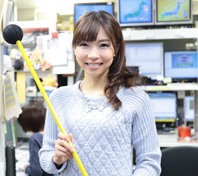
Natsumi Terakawa, Certified Weather Forecaster, Weathercaster for NHK NEWS 7
Profile
Born in Shimonoseki City, Yamaguchi Prefecture, Terakawa graduated from the Keio University Faculty of Science and Technology, Department of Applied Chemistry in 2006. After working as a bank employee and cram school teacher, she became a broadcaster in a regional TV information program for NHK Tottori Broadcasting Station. In 2008, she became a certified weather forecaster, and since April 2011, serves as the weathercaster for NHK NEWS 7. She belongs to Wing Inc. Her hobbies are running and jazz dancing.
Since childhood I always had a vague aspiration to become a TV announcer
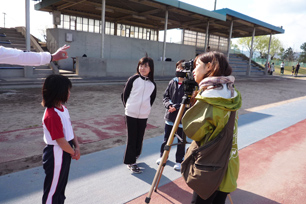
─ The islands of Japan have recently been at the mercy of natural disasters such as heavy snow, torrential rain, and huge typhoons. The summer’s heat and winter’s cold are severe, which makes us realize the importance of daily weather information. I understand you are a certified weather forecaster, and the weathercaster for NHK NEWS 7. Did you aspire to become a weather forecaster when you were in university?
No, back then, I wasn’t sure what I really wanted to be, and I was worried about it. However, I did have a vague desire to work in the world of mass media, because my childhood dream in elementary school was to become a TV announcer. When I became a junior high school student, a teacher at my cram school told me that a career as an announcer could be suitable for me, and my enthusiasm got stronger. The teacher probably said it casually, but my dream kept growing.
In my hometown, my high school guidance counselor encouraged me to try for the entrance exams for Keio University. The teacher knew that I wanted to become an announcer, and I studied hard for the exams. You may think that to become an announcer, I would have chosen a faculty in the humanities, but I was good at science, especially chemistry, so I had no hesitation in choosing the Faculty of Science and Technology.
Although I was successful in becoming a Keio University student, I met and saw many excellent students studying hard with clear objectives. So as I advanced through university, my simple-minded desire of wanting to work in the mass media industry or seek a career as a researcher crumbled away. When my job-hunting started, I applied for all the major TV stations in the Tokyo metropolitan area to seek a position as an announcer, but with no clear objective, I failed miserably. Looking back, although I went to take the entrance exams for those companies as an extension of my childhood aspiration, I think my desire to work in the mass media was not strong enough. It was no wonder I failed all the exams.
─ At that point, becoming a weather forecaster wasn’t an option for you?
Not at all. I only found out after joining a financial company that such a profession existed. Even after starting my career, I kept thinking about my future possibilities, and was always on the lookout to explore different options. These are things I was supposed to think about while job-hunting, so I was late to realize them. Anyway, around that time, I coincidently found a magazine at a bookstore that had a special-feature article on weathercasters. There was also information about the qualification. I felt that getting certified as a weather forecaster might be just the right thing for me because I was good at science, and it might help me in getting a job in the mass media industry. I felt like I finally found my way. I kept my job at that company, and I would wake up early in the morning to study and continued that routine for a year.
The weather forecaster certification exam comprises three categories. There are two written exams, one of which is a general knowledge test and the other a technical knowledge test related to meteorological services. The third is a practical exam in which you have to read the meteorological chart and create a forecast. While continuing my job, I was able to pass one written exam, and I felt very positive. So aiming to pass the other two exams within a year, I left my job and focused on studying at my parents’ place. Although I worked part-time at a cram school, I thought that I would have plenty of time for study. However, I failed the exam. I felt very down for not being diligent enough.
I realized the very important role that weather forecasters play after seeing the damage caused by the extraordinarily heavy snowfall in the Sanin area around New Year’s Day in 2011.
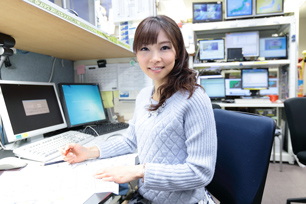
─ Recently, the national exam for certified weather forecasters has become quite difficult with a pass rate of below 5%, and many people seem to be trying multiple times.
My family always supported me while I continued studying at my parents’ house, but there were times when I would get into quarrels with my mother over little things because of my anxiety and stress. However, I just couldn’t give up, so I decided to try just one more time and kept studying. My mother’s strictness was actually an expression of encouragement to tell me that I have to realize my dream on my own. I was able to pass the two tests on my next try, and I owe it all to my parents.
Actually, just before the announcement of the test results, a friend from high school who worked as a reporter at NHK Tottori Broadcasting Station asked me if I wanted to audition for a position as a broadcaster for a noontime regional information program. She remembered me mentioning in high school that I wanted to become an announcer. What you need is a good friend. Just as I was hired by NHK after passing the audition, I received a notification that I passed the weather forecaster certification exam. In any case, I wasn’t in a situation that enabled me to make use of this qualification right away, so I proceeded to accept the job as a broadcaster for the NHK Tottori Broadcasting Station.
From my experience dealing with so many children as a cram school teacher, I felt that these children filled with energy and life, who will bear responsibility for the future, are our treasure, and therefore proposed a show named “Tottori Kids.” The program, which put the spotlight on kids, was designed for the general public to learn more about the children living in Tottori, and I would run around the prefecture to do stories about them. Local stations don’t have many staff, and I had to be in charge of the planning, reporting, filming, editing as well as being the broadcaster. So I was extremely busy, but it was really exciting to ride trains and buses and cover stories, with a camera and tripod in hand. Children who were shy at first would run to me when I would come back to see them for the second time, and everyday was so fulfilling.
Then one day, there was a life-changing event that made me strongly realize my role as a certified weather forecaster. It was the extraordinarily heavy snowfall in the Sanin area from December 31st to New Year’s Day of 2011. The local farming and fisheries suffered severe damage. Since I was on vacation and was spending the holidays at my parents’ house, I found out about the seriousness of the damage on TV. I regretted that when it had started to snow as the end of the year approached, there may have been something I could have said in my show about the snow as a certified weather forecaster. I realized that going one step further as a broadcaster—to deliver the message that “the approaching snow storm is of a different level from that of a normal one” in a way that would get the public’s attention—is the mission of the people working in mass media and also the mission of a weathercaster. It turned out to be a very painful New Year’s holiday, as I thought about the farmers and fishermen I met through my show, and it was just heart-wrenching.
This experience became the trigger to become a weathercaster. When my contract with NHK Tottori Broadcasting Station ended, I joined Wing Inc., to which many weathercasters belong, and since April 2011, I serve as the weathercaster for NHK NEWS 7. Since this is on national television, my parents, grandparents, and friends were happy about it, but this was actually the start of another huge challenge. At that time, I didn’t have enough expertise and analyzing skills on meteorology, and my skill at delivering information was still immature. I felt bad about it for the next twelve months.
Based on the data released by the Japan Meteorological Agency, the analysis and deciding how and what should be explained to the viewers are up to each weathercaster of each TV program. In our daily meetings, all weathercasters gather to discuss the weather forecast that will serve as the basis for that day, and make sure we agree on it. This is because information that we release should be consistent from show to show. Although now I feel more comfortable with my job, studying is always essential. The more experienced I become, the more I realize the difficulty and depth of weather forecasting. I think I study much more today than when I was a university student.
What was the most tormenting memory after becoming a weathercaster was the extremely heavy rainfall in Kii Peninsula, which was caused by Typhoon 12 that developed in September 2011 in my first year as a weathercaster. We forecasted rainfall of around 1000 millimeters and alerted the public, but back then, I didn’t fully understand how much damage a 1000-millimeter rainfall can do, such as river flooding and landslides. I still feel sorry and a great sense of regret that I may not have provided enough information, and this experience has become a motivation to continue my studies.
I am sometimes asked about being Miss Keio, and I have to explain every time that it was just within the Faculty of Science and Technology.
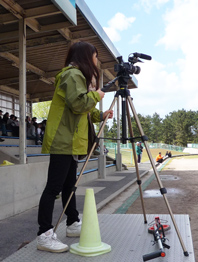
─ What memories do you have of your life at Keio University?
I fondly remember a Russian language class of Professor Masumi Kindaichi. He said, “I started to study Russian seriously when I was almost 30 years old, and after a lot of study, I am now in the position to teach it. It is never too late to learn something new.” These words encouraged me back then because I had been worrying about my future.
I also belonged to a women’s basketball circle. It was a unique circle in that we were not allowed to use honorific expressions among each other. This was in order to enjoy our activities regardless of our age or grade, without worrying about who is senior and who is junior.
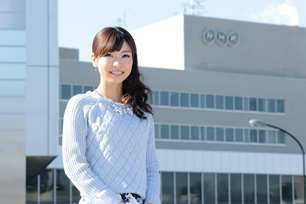
─By the way, I heard that you were selected as the inaugural “Miss Yagami”.
This is a fond and at the same time, an embarrassing memory. A lab mate was desperate in finding someone who can participate, and begged me to apply for it, and I couldn’t say no. Even on the day of the event, I regretted being there. However, when it came to the time to vote, my lab mates in their white coats, my friends from my circle, and even Professor Kindaichi came to vote for me, and it turned out to be an event in which I felt gratitude for having such a nice mentor and friends. This is just a little memory of my university life, but after I started this job, I am sometimes asked about becoming Miss Keio back then, and I have to explain every time, “Oh, no. It was just an internal event at the Faculty of Science and Technology,” which is quite embarrassing at times.
─Finally, could you give a message to current Keio University students?
There were many twists and turns until I finally got on the career path as a weathercaster. However, I feel great joy today being able to do a challenging job that I love. I believe some of you may be worried or confused about your future, but if you keep working hard on what is at hand, your objectives will become clearer little by little. I hope you take your time in figuring out what you really want to do.
─Thank you very much.
*Position titles, etc., are those at the time of publishing.
